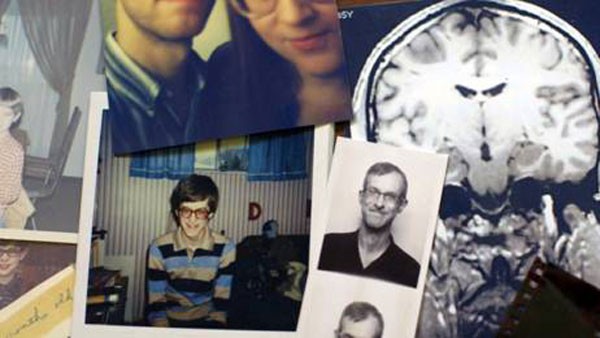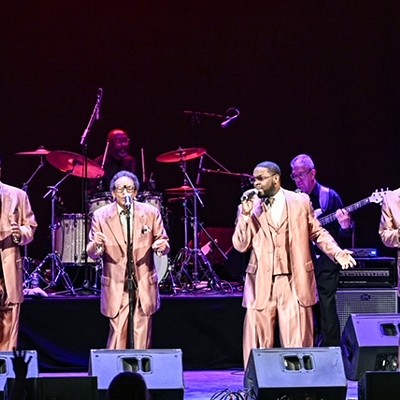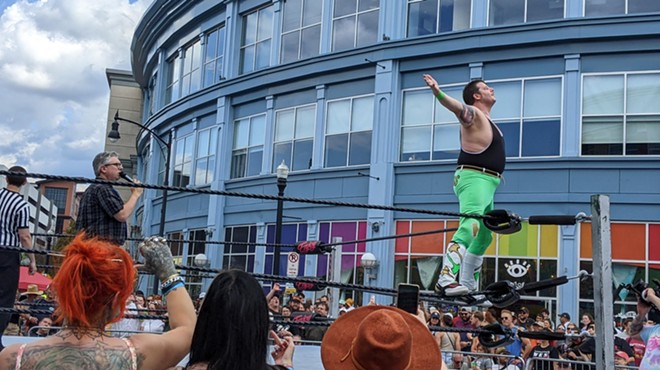Dating is full of unstated conventions that mystify even the most socially adept among us. But what if your neurobiology kept you from fully appreciating all of the subtle social cues that can be critical to finding love? That's the question local documentary filmmaker Julie Sokolow explores in her latest project, Aspie Seeks Love. The film features 49-year-old David Matthews, an Aliquippa native who was diagnosed with Asperger's syndrome in his early 40s. The film has already collected some national headlines and film-festival awards. Matthews spoke with City Paper in advance of its Pittsburgh premiere, 7 p.m. Thu., March 26, at the Regent Square Theater. This show has sold out. An extended run is planned for April 25-29 at the Harris Theater (412-682-4111).
Dating with an audience of one is hard enough. What made you suggest to Julie Sokolow to do a documentary on your dating life?
[Julie] had actually suggested this. I'd contacted her around April 2011 because I'd run across her Facebook page and I liked her credentials, so I emailed her asking if she could direct a short film for me — sort of a promotional piece to impress a woman to whom I was attracted. However, as it turned out, the woman wanted nothing to do with me, unlike Julie, who deemed my life worthy of a full-length documentary. She'd seen me for years putting up my personal-ad flyers, and she considered the flyers very unique and sort of an individualistic take on dating. So we met and she liked my company so much, she started filming my experiences dating.
I know that you were kind of famous around town [for the] flyers. Did you ever get responses to them?
In the early days, I did receive some responses, particularly after [an] article that the Pittsburgh City Paper published in 1996 chronicling my experiences — I'd written that article, by the way. But as the years progressed, I received fewer and fewer responses. But by that time, the personal-ad project had turned into a performance-art piece satirizing the gender ideals of men and women and how men and women interact with each other.
Tell me a bit more about that satire.
I wanted to turn myself into a product; I wanted to satirize the various ways people present themselves in romantic situations, because essentially people adopt a character whenever they interact with others for possible romance. So I wanted to be up front about the artifice, so to speak.
In some ways, the film reads as an indictment of the dating scene — that we're so hung up on silly social conventions that the people you date can't see you for who you really are: a smart, funny, talented artist.
For the longest time, I had a problem of presenting myself effectively to other people. Due to my appearance and my, some would say, affectless, speaking voice, I've had some difficulty in connecting with the opposite sex. It's taken me quite some time to learn how to tone down the so-called weirdness and appeal to other people on their levels, rather than on just my level.
What was that process like?
I toned down the weirdness; I sometimes repressed how I really felt about a particular situation; and I paid more attention to how the other person felt, how she perceived the situation, and I intentionally tried not to discomfort other people.
What made you open to letting the public have a front-row seat to your dating life?
Julie convinced me that documenting my experiences for the public would help the public better understand the problems that somebody with my neurologic condition might have in interacting with the outside world. And I didn't intend to be the poster child for the autism spectrum, but apparently, I have to, due [to] the popularity of the documentary at the various film festivals. […] [Julie's] always had an interest with how people interact in what those people might consider strange environments. That is, people in the conventional fish-out-of-water tale.
I assume you've seen the documentary. What was your reaction to it?
I already have seen it as a download on the miniscule computer screen, but seeing the documentary for the first time on the huge screen at the Cinequest film festival, in San Jose, California, made me a little nervous at first, making me wonder how the audience would perceive my behavior. But as I gauged the audience's very favorable response, I felt comfortable seeing my life blown up, so to speak. And I felt honored that the other film-goers considered me quite an interesting person and deserving of all that praise.
Is there anything you hope the documentary conveys to audiences?
Yes, that everyone regardless of his or her neurological condition or intelligence, or looks, or whatever, deserves compassion and understanding, as corny as that may sound.
You seemed pretty open with the project. You were willing to fill out an OkCupid questionnaire on camera that included a description of your masturbation habits.
Yes, yes. I have some concerns with that scene. I personally wish Julie hadn't included that scene in the documentary, but she contends that the scene makes me more human, [that] it makes me more accessible to a wider audience.
Was there anything you told her you wanted to be completely off limits?
I may have, but I can't remember.
Do you think the presence of a camera changed your interactions with the people you dated?
Yes, the presence of the camera may have made me behave more assertively. It might have made me more purposefully go for the laughs — again, appealing to that vast audience. Because nobody wants to watch a Gloomy Gus for 73 minutes.
The documentary mentions you weren't diagnosed until your early 40s. Did the diagnosis change the way you felt about yourself?
Yes, I should tell you the circumstances behind that diagnosis. In 2006, I went out on a date with a Canadian expatriate attorney. I met her at her apartment. We went to her balcony and conversed for 45 minutes. Then, apropos of nothing, she asked if I'd ever been diagnosed with Asperger's; I'd vaguely heard about that condition. The woman in question had two children with autism, so she had grown quite adept at spotting autistic symptoms, and she thought that I might have Asperger's, due to the slow, learned way I spoke and [my] clumsy movements. She suggested I should get tested for Asperger's, which I did, and the diagnosis came back positive. After receiving the diagnosis in 2006, I felt relieved that I hadn't self-willed my so-called eccentricities, that I had a biological reason for the way I behaved. But I do not blame the Asperger's for everything I do. I realize that I am solely responsible for how I behave. After receiving the diagnosis, I started looking for ways to improve myself regardless of the Asperger's.
Did it change the way you thought about dating?
Yes. For quite some time I would not tell the women I dated that I had a neurological condition. But eventually I would, and most of them were understanding. I recall a few who immediately broke up with me because they couldn't bear hanging out with somebody who would behave the way I did.
Some responses to the film characterize you as "lonely" or "sad." Is that an accurate description of how you feel about yourself?
You can say that I had a chipper personality. I don't consider myself sad; I consider myself more realist. I used to consider myself lonely, but now, with my dating history and the response I've had to the documentary, I don't consider myself lonely. Though I do crave solitude, probably more than neurotypicals do.
What are you up to now?
I'm trying to finish my first novel. It's a novel about a gentleman who runs a media-production company in Pittsburgh. I hope to finish this novel this year. I tend to write exceedingly slowly. I know I should speed up my process of creation if I expect to remain in the public eye. This novel deals with how the media presents reality, and also deals with the idea of selling out, or as the youngsters put it today, "buying in." It deals with what exactly it means to live in modern, mediated America. The novel takes place in Pittsburgh. The novel also deals with sexual paranoia and Obama-era politics.
How's dating life been since the cameras left?
The documentary explains that — I don't want to give away too much in this interview. But all I'll say is my dating life has turned out quite well.















